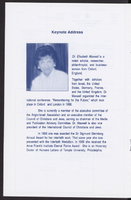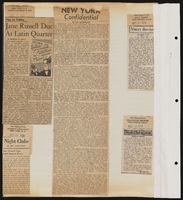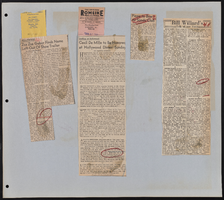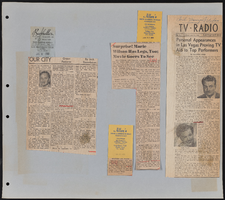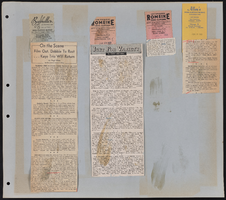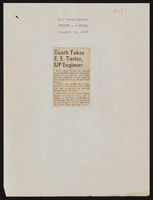Search the Special Collections and Archives Portal
Search Results
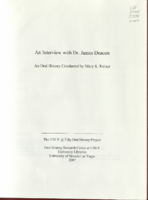
Transcript of interview with Dr. James Deacon by Mary K. Keiser, August 24, 2006
Date
Archival Collection
Description
Text

Transcript of Interview with Barbara Kirkland
Date
Archival Collection
Description
On a sunny day in 1946, the train from Shreveport, Louisiana, stopped at The Plaza hotel in downtown Las Vegas like it always did. But on this particular day, Atha Toliver and her only child, twelve-year-old Barbara, stepped off the train and onto the dusty Western street of Fremont. Narrator Barbara Bates Kirkland recalls that event and living in Las Vegas for most of the next seven decades during this 2004 interview. Like many others who migrated from the South, Barbara Kirkland’s mother would find employment as a maid. A friend who already lived in Las Vegas had told her of the good paying jobs as private maid. So Atha who was determined that her daughter would get an education and a finer future saw this as her opportunity to achieve this for her daughter. Later, the entrepreneurial and creative mother opened Eva’s Flower Basket, a floral shop that Barbara operates in her retirement from teaching. Barbara returned to Louisiana for her senior year in high school, attended Southern University in Baton Rouge, and then returned to Las Vegas to teach first grade at Westside School. Barbara was active in the community, was a founding member of Les Femmes Douze, involved with Zion United Methodist Church and was friends with many of the early African American community leaders at the time. She talks about these, describes various neighborhoods where she lived and about raising her own two children in Las Vegas. Barbara was a founding member of Les Femmes Douze. AKA/Akateens.
Text

Transcript of interview with Mary Laub by Wendy Starkweather, December 02, 2013
Date
Archival Collection
Description
Text
